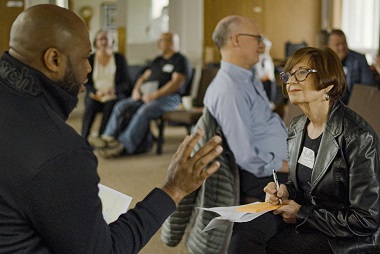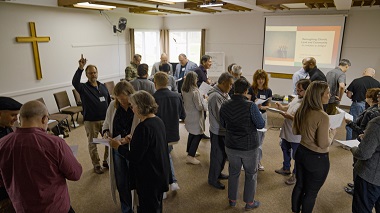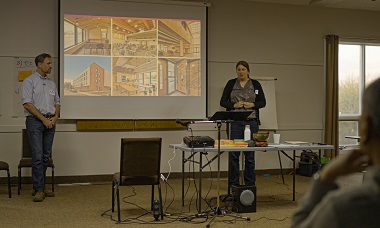
Tellison Glover (left) was one of several Metro Vancouver leaders who took part in a gathering to “reimagine the use of church property and buildings across Canadian churches.”
Creating Conversation is a weekly editorial, curated by the Centre for Missional Leadership (CML), which gives opportunity for people to speak about issues they believe are vital for the church in Vancouver.
One of the goals of this weekly article is to spark dialogue – and action. We invite you to join the dialogue here on the Church for Vancouver website.
We also invite you to use the article as a discussion starter with your small group, church staff, friends and your neighbours. Thanks for participating in the conversation!
How might we reimagine the use of church property and buildings across Canadian churches? That was the question that led CityGate to gather and curate a conversation with 30 people from across Canada – all of whom have been working on or thinking deeply around this question.
For two days, we met at Crieff Hills Retreat Centre in Ontario where we gained a sense of the urgency around this question, given factors like these:
- Close to 4,500 churches have closed in the past 10 years, meaning that many of these buildings are being sold off to private developers who may have little sense of the common good, let alone the vision of God’s kingdom.
- Many new churches (3,200 in the last 10 years) are looking for meeting spaces and struggling to find suitable church buildings to meet in. (These two alternate trends expose the need for cross-denominational collaboration in church planting).
- Many churches in urban centres are on land or have buildings that are highly underutilized amidst rapidly rising real estate values.
- Civic governments and social service agencies are looking to churches for space in urban spaces where affordable gathering spaces are becoming scarce.
- Church lands hold symbolic value for how we treat land more broadly. If church lands can become a sign of reconciliation with Indigenous peoples or for a reimagined common space, perhaps they can catalyze movement towards these practices on a wider scale.
Urgent conversation

David Kupp (left) and Tim Dickau led participants through discussions, presentations and dialogues.
For all these reasons and more, engaging this conversation does seem urgent and vital for the church in Canada at this time.
Present for this crucial dialogue were non-profit housing developers who work with churches – like Indwell, Kindredworks and the Nest – as well as groups such as Trinity Centres Foundation which work more broadly on development projects.
Also contributing to the conversation were an urban planner, architects, denominational leaders, an Indigenous leader, pastors and consultants.
David Kupp (director of the Community Development MTS track at Wycliffe College in Toronto) and I led these participants through a combination of table discussions, presentations, dialogues and exercises that revealed both commonalities and particular passions for how to utilize these properties better.
We shared and heard many stories at the gathering about reimagined church properties that now include supported housing, affordable housing, eco-stewardship features, community hub uses and designs, social enterprise start-up space and other creative uses.
The consensus from participants following the gathering was that churches and denominations are being called to widen our imagination for church properties, to be more engaged with stakeholders beyond the church in this effort and to be proactive in our explorations rather than waiting until we are forced into making decisions in desperation.
Broader framework
One aim of this gathering was to frame these questions within a broader framework, to transcend a merely pragmatic approach to redevelopment.
Towards that end, Jason McKinney (Toronto parish Anglican priest, theologian, educator) invited us to view crises around land as a catapult to fresh theological inquiry (as past crises have) and to “hold” land vs “have” land in a renewed sense of land as gift for others.
Adrian Jacobs, a Six Nations elder and leader in the Christian Reformed Church, challenged at least some of our churches to enter into a “spiritual covenant” with our Indigenous neighbours around church lands that would include a “lease” payment and a promise to return the land should the congregation dissolve.
Both of these speakers were convincing, leading to a reality check for many of us as we realized how far many of our churches are from embracing these perspectives.
Extend conversation

Graham and Emma Cubbitt presenting some of Indwell’s supporting housing projects.
All more reasons to widen and deepen this conversation. We also recognized and acknowledged that reimagining church properties offers us an opportunity to bear witness to the self-giving God in multiple ways, through how we use and develop our church land and buildings.
We also recognized that this reimagination needs to be worked out contextually, as Montreal (many Catholic and Anglican stone heritage buildings) is so different from Vancouver (largely wood structures without much heritage value) which is in turn so different from the development possibilities in towns or rural churches.
Those who gathered are discerning how best to extend this conversation to our various geographic locations and denominations and hope we might resource those conversations.
Two conclusions were sure: we need to keep the conversation going and we need to widen it to include the many churches which are starting to ask what it means to steward their land and buildings at this time in history. The time for this conversation is now! I hope you and your church will join in it.
If your church is thinking about how to better utilize your land and building assets, contact Tim Dickau at Citygate – [email protected] – for a conversation, consultation or referral to one of the participating agencies.
Rev. Dr. Tim Dickau serves as Director of CityGate Vancouver, as well as CML Associate for the Missional Leadership Certificate Program. Prior to taking on these roles, Tim served for 30 years as pastor of Grandview Church in East Vancouver, where he was widely recognized as an effective missional leader.
Other Metro Vancouver participants at the gathering were:
- Andy Lambkin (the Nest, Simple Churches)
- Nicholas Lai (retired senior planner, City of Surrey)
- Tellison Glover (Anglican Diocese of New Westminster)
- Jodi Spargur (Healing at the Wounded Place)
- Sean Tan (CityGate board)
